2023 年四川内江中考英语真题及答案
本试卷分 A 卷(选择题)和 B 卷(非选择题)两大部分。A 卷第 1 至 8 页,满分 100 分;B
卷第 9 至 10 页,满分 60 分。全卷满分 160 分,考试时间 120 分钟。
注意事项:
1.答题前请仔细阅读答题卡上的注意事项。
2.所有试题的答案必须按题号填写在答题卡相应的位置上,在试卷上、草稿纸上答题无
效。
3.考试结束后,监考人员将试卷和答题卡一并收回。
A 卷(选择题,共四部分,满分 100 分)
第一部分听力(共两节,满分 30 分)
答题时,先将答案划在试卷上。听力部分结束前,你将有两分钟的时间将你的答案转涂到
答题卡上。
第一节(共 5 小题;每小题 1.5 分,满分 7.5 分)
听下面 5 段对话。每段对话后有一个小题, 从题中所给的 A、B、C 三个选项中选出最佳
选项。听完每段对话后, 你都有 10 秒钟的时间来回答有关小题和阅读下一小题。每段
对话读两遍。
1. How will the speakers go to the library?
A. By bus.
B. On foot.
C. By taxi.
2. What will Eric do at the weekend?
A. Take a class.
B. Visit his uncle.
C. Help his
parents.
3. What is Lily doing?
A. Doing her homework.
B. Cleaning the
kitchen.
C. Reading a book.
4. What would the man like?
A. Orange juice.
B. Coffee.
C. Tea.
5. What's the probable relationship between the speakers?
A. Doctor and patient.
B. Driver and
passenger.
C. Brother and sister.
第二节(共 15 小题; 每小题 1.5 分, 满分 22.5 分)
听下面 5 段对话或独白。每段对话或独白后有几个小题, 从题中所给的 A、B、C 三个选
项中选出最佳选项。听每段对话或独白前, 你将有时间阅读各个小题, 每小题 5 秒钟;
�
听完后, 各小题将给出 5 秒钟的作答时间。每段对话或独白读两遍。
听第 6 段材料, 回答第 6、7 题。
6. How often does the woman have erhu classes?
A. Three times a week.
B. Twice a week.
C. Once
a week.
7. Where will the woman go?
A. To the bus station.
B. To the supermarket.
C.
To the office.
听第 7 段材料,回答第 8 至 10 题。
8. Who will give a talk?
A. Mr. Green.
B. Bob.
C. Jim.
9. How long will the talk last?
A. 1 hour.
B. 2 hours.
C. 3 hours.
10. Where is the hall?
A. On the first floor.
B. On the second floor.
C.
On the third floor.
听第 8 段材料, 回答第 11 至 13 题。
11. What was the weather like last night?
A. Rainy.
B. Windy.
C. Snowy.
12. What was Hardy doing when all the lights went off?
A. Having a trip.
B. Reading a book.
C. Watching
TV.
13. When will Gina pick up her parents?
A. This morning.
B. This afternoon.
C. This
evening.
听第 9 段材料,回答第 14 至 16 题。
14. What did Monica use to be like?
A. Shy.
B. Brave.
C. Clever.
15. Who always encouraged Monica?
A. Her classmates.
B. Her brothers.
C. Her
teachers.
16. How could Monica win the singing competition?
�
A. By practicing every day.
B. By asking her parents for
help.
C. By taking after-school training.
听第 10 段材料, 回答第 17 至 20 题。
17. What does Paul do?
A. A doctor.
B. A train driver.
C. A policeman.
18. What happened when Martin was smoking?
A. A fire broke out.
B. The train stopped.
C. The
train slowed down.
19. When can Martin take the train again?
A. Six months later.
B. Five months later.
C.
Four months later.
20. What does the speaker tell us to do?
A. Stop smoking.
B. Be careful of fire.
C.
Follow the rules.
第二部分 阅读理解(共两节,满分 50 分)
第一节(共 15 小题;每小题 2.5 分,满分 37.5 分)
阅读下列短文, 从每题所给的 A、B、C、D 四个选项中, 选出最佳选项, 并在答题卡上
将该项涂黑。
A
Free eBook Library
Are you still worried about your child’s reading at home? Welcome to our
free eBooks collection for children aged 3—11 years old. If you’d like to learn
more about how to support your child’s reading, visit our Reading pages.
•All our eBooks are free, but you have to sign up at https:
//www.oxfordowl.co.uk/for-home log-in and start reading
•Want to read with recording? Click (点击) the sign
•Some of the most popular eBooks
Age 3—4: Dad’s Birthday
Age 5—6: The Trunk Skunk
Friendship
Dolphin Rescue
Goodnight, Sleep Tight
Red Ned
Age 7—8: Biff, Chip and Kipper Age 9—11: Exploring Deep
�
Songbirds
Sherlock Holmes
Alien Adventures
Double Exposure
•Oxford dictionaries
Help your child build their vocabulary and develop spelling skills.
•Tell us what you think
Take part in our survey and let us know how you are using it. The survey
is open for anyone and we’d love to hear from all of you!
1.How can readers get the eBooks for free?
A.By clicking the sign.
B.By signing up on the website.
C.By taking part in a survey.
D.By visiting the Reading pages.
2.Which book is popular among 10-year-old children?
A.Friendship.
B.Songbirds.
C.Dolphin Rescue. D.Double
Exposure.
3.Who may be most interested in the eBook library?
A.College students.
B.University teachers.
C.Parents of young children.
D.Writers on the Internet.
B
Mrs. Brown is a farmer. She lives a peaceful and happy life with her family
on the farm. Every day she gets up at six o’clock in the morning and then starts
her work: water the plants, clean the yard, take out the rubbish, and pick some
vegetables from the garden for lunch, …, a lot of work to do! Mr. Brown usually
makes noodles and eggs for breakfast.
But today Mr. Brown isn’t in the kitchen. She looks at the table. There
is no food for her.
“Tom!” she calls her son loudly. But there’s no answer.
“That’s strange,” she thinks.
Mrs. Brown goes outside to the yard and calls Max, her dog.
“Max!” she calls. Max doesn’t come.
“That’s strange,” she thinks.
Mrs. Brown goes to feed the chickens.
�
She looks in the backyard. No chickens.
“That’s strange,” she thinks.
Mrs. Brown goes to see the cows.
She looks in the barn, a place for housing her cows. No cows.
“That’s strange,” she thinks.
Mrs. Brown looks in the field. No animals.
“Where are the sheep? Where are the pigs? Where’s the horse? That’s very
strange!” she thinks.
Just at that time, Mrs. Brown hears a noise behind the house.
She goes to look.
Everyone’s in the garden: Mr. Brown, Tom, Max, the chickens, the cows, the
pigs and the horse.
“Surprise!”
“Where’s my breakfast, honey?”
“Today’s breakfast is cake. Birthday cake! Happy birthday, my love!”
4.Which word best describes Mrs. Brown’s morning?
A.Busy.
B.Boring.
C.Quiet.
D.Relaxing.
5.How many people are there in Mrs. Brown’s family?
A.Two.
B.Three.
C.Four.
D.Five.
6.What is Mr. Brown doing this morning?
A.Preparing for his wife’s birthday. B.Taking care of the animals.
C.Making breakfast for his family.
D.Taking out the rubbish.
7.Which can be the best title for the text?
A.She’s Angry
B.He’s Smart
C.That’s Strange D.It’s Terrible
C
What do you imagine cities will be like in the future? Will we have smart
buildings and flying cars? Or robots that will pick up our rubbish? What about
schools? Will we still travel to school or will we study online from home? Perhaps
all the buildings and roads will be underground and we’ll just have parks and
cycle lanes(自行车道) above. Maybe…or maybe not, but what we do know is that
in the future, cities are going to have more and more people living in them.
�
More than half the world’s people already live in cities, and by 2050, cities
will become homed to about 6.5 billion(十亿) people. That’s a lot of people
and very little space! More people means that we’re going to have more pollution,
traffic and noise. It also means that we’ll need more homes, schools, hospitals,
jobs and transport. We’ll need more water, oil, coal(煤) and electricity. Oh,
more ways to grow food for so many people!
Many cities are already planning for the future. For example, Bristol is
a cycling city in England. You can ride a bike in cycle lanes which are separated
from the traffic. To save land, people in Singapore and Tokyo grow vegetables
in tall buildings, called“vertical farms”. And in Amsterdam in the Netherlands,
there are “floating houses” built on water instead of on land!
8.What do we know about future cities for sure?
A.Robots will pick up our rubbish.
B.There will be many smart buildings.
C.Students will study online from home.
D.More and more people will live
in them.
9.What is the second paragraph mainly about?
A.Problems in future cities.
B.Plans about building future cities.
C.Advice on managing future cities.
D.Ways of feeding people in future
cities.
10.Which city has separate cycle lanes from the traffic?
A.Tokyo.
B.Amsterdam.
C.Bristol.
D.Singapore.
11.What do “vertical farms” and “floating houses” have in common?
A.They are easy-made.
B.They are good-looking.
C.They are land-saving.
D.They are water-covered.
D
The Spring Festival holiday runs from Jan. 21 to 27 this year. Influenced
by the 2022 Beijing Winter Olympics, ice-and-snow tours flower among Chinese
people during the seven-day holiday.
He Rui spent the first day of the Spring Festival holiday at home. He went
to the ski resort (滑雪胜地) in his city early on the second day and was ready
to start the Year of the Rabbit on his snowboard.
�
Since he started skiing two years ago, the 11-year-old has gotten used to
getting up early and practicing skiing.
“People used to stay at home during the Spring Festival holiday. But as
our society pays more attention to healthy lifestyle, more people want to spend
their holiday skiing,” said Chang Yulin, director of a ski resort. “We hold
colorful activities here so that visitors can both enjoy skiing and have a
special Spring Festival holiday,” said Ren Xiaoqiang, manager of the resort.
For Qiao Jian, a ski lover from Shanxi, skiing has become his new habit to
celebrate the Spring Festival. He has flown to Heilongjiang Province (省) and
Hebei Province, because there’s more ice and snow.
“Besides taking part in winter sports, we can visit nearby places to
experience more local culture,” Qiao said.
The number of snow and ice travelers in China is expected to reach more than
300 million in winter. The number is expected to reach 520 million in three years.
And the money from ice-and-snow tours will probably reach ¥720 billion.
12.What does the underlined word “flower” in the first paragraph mean?
A.Become popular. B.Grow slowly.
C.Cost much money. D.Develop
difficultly.
13.When did He Rui go to the ski resort?
A.On January 21.
B.On January 22.
C.On January 27.
D.On January 28.
14.Who has been to other provinces to enjoy skiing?
A.He Rui.
B.Qiao Jian.
C.Chang Yulin.
D.Ren Xiaoqiang.
15.Where is this text probably from?
A.A tour guide-book.
B.An invitation letter. C.A short
story.
D.A news report.
第二节(共 5 小题; 每小题 2.5 分, 满分 12.5 分)
根据短文内容,从短文后的选项中选出能填入空白处的最佳选项。选项中有一项为多余
选项。
It’s not a secret that there are some bad people on the Internet.
16
.
So it is necessary to pay much attention to Internet safety. However, staying
safe online doesn’t ask you to turn your Internet off.
17
.
�
•Check the links (链接) carefully
You may often receive unknown links when you check your emails or read online.
Before clicking them, you should make sure they are safe.
18
.
First,
put the mouse over it and the full link will appear near the mouse. Then you
can compare this link with the official (官方的) website. If they are the same,
the link is safe.
•Avoid sharing your personal information
19
.
The information includes your family information, bank
information, and the password (密码) to your social media. You should also know
that anything you post on social media may continue to be there online for a
long time. So, be careful about anything you post on the Internet.
•
20
.
If a public Wi-Fi doesn’t have a password, it is possibly unsafe. Don’
t use such a Wi-Fi. When you have to use one, avoid entering in any personal
information.
A.Remember to use a safe public Wi-Fi
B.They try to get your money or information
C.There’s a good way to tell whether a link is safe
D.It is very important for you to keep the password safe
E.You should never tell others your own information online
F.The following advice will help you avoid dangers on the Internet
第三部分 语言知识运用(共 15 小题;每小题 1 分,满分 15 分)
阅读下面短文,从短文后各题所给的 A、B、C、D 四个选项中,选出可以填入空白处的
最佳选项,并在答题卡上将该项涂黑。
On Sunday morning, Hithendran, a young man, went to see his friends. He went
there by
21
. He had a good time with his friends. At about five o’clock
in the afternoon, he was coming back home on his bike. Unluckily, something
22
happened. The young man met with a(an)
23
. He was hit by a coming car.
The people on the road knew him. They
24
his parents at once. Seeing their
son badly hurt, his parents
25
him to Apollo hospital.
After examining him, the doctors said that his brain had lost his senses.
�
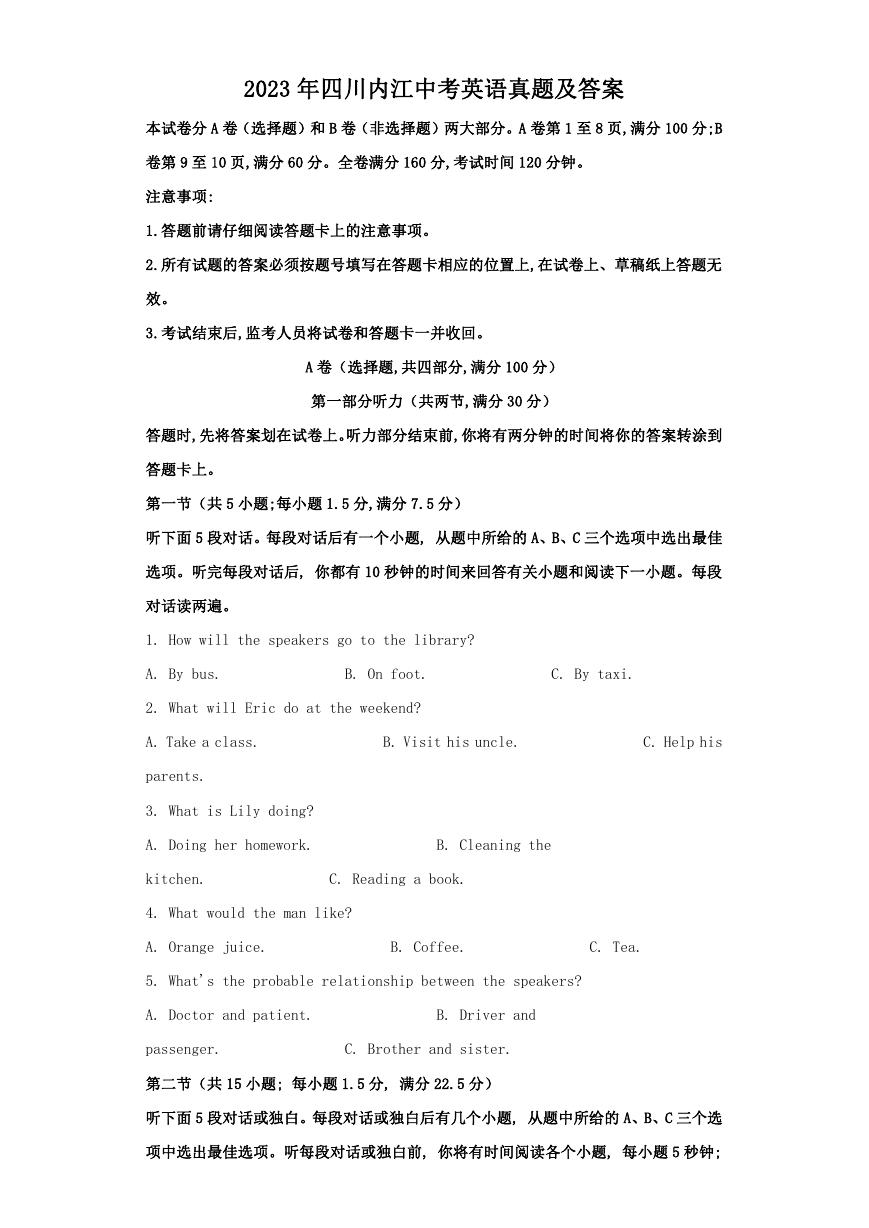
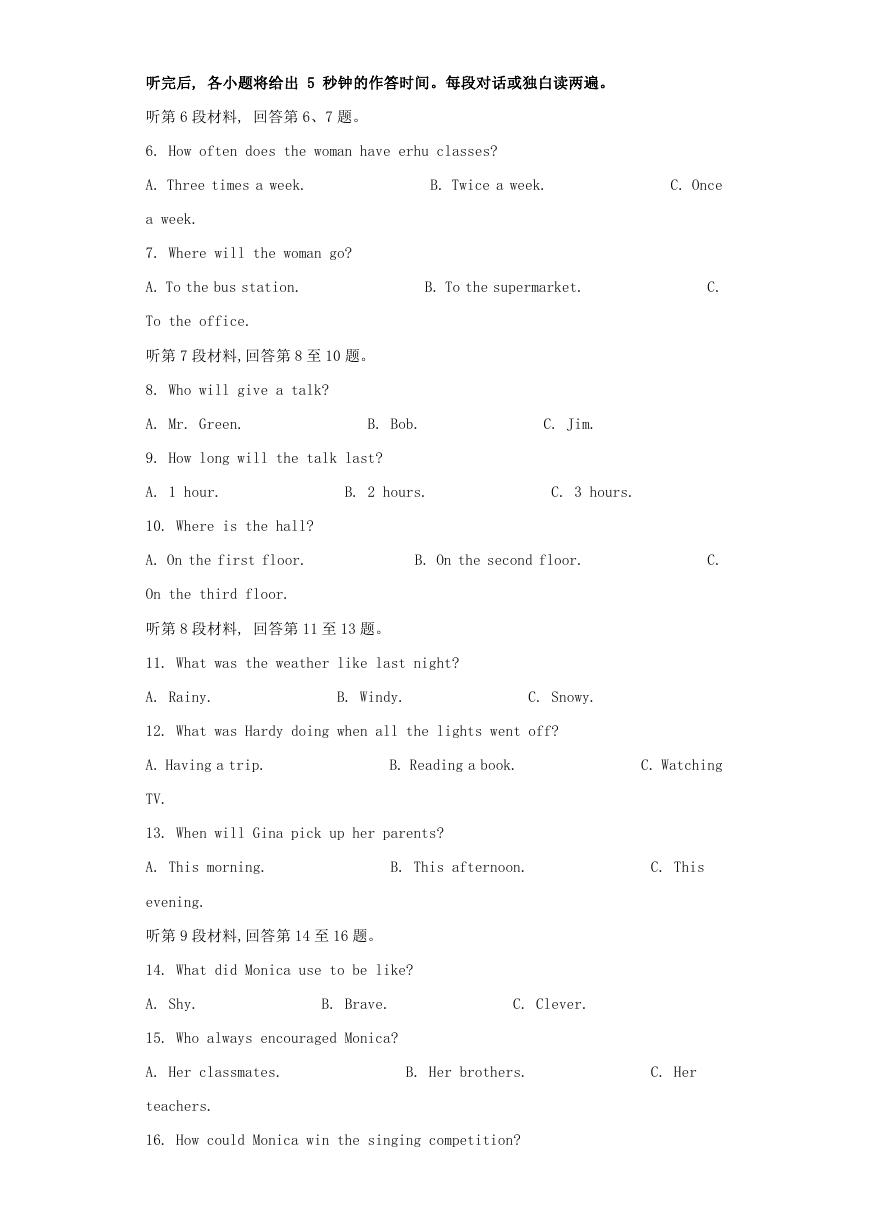
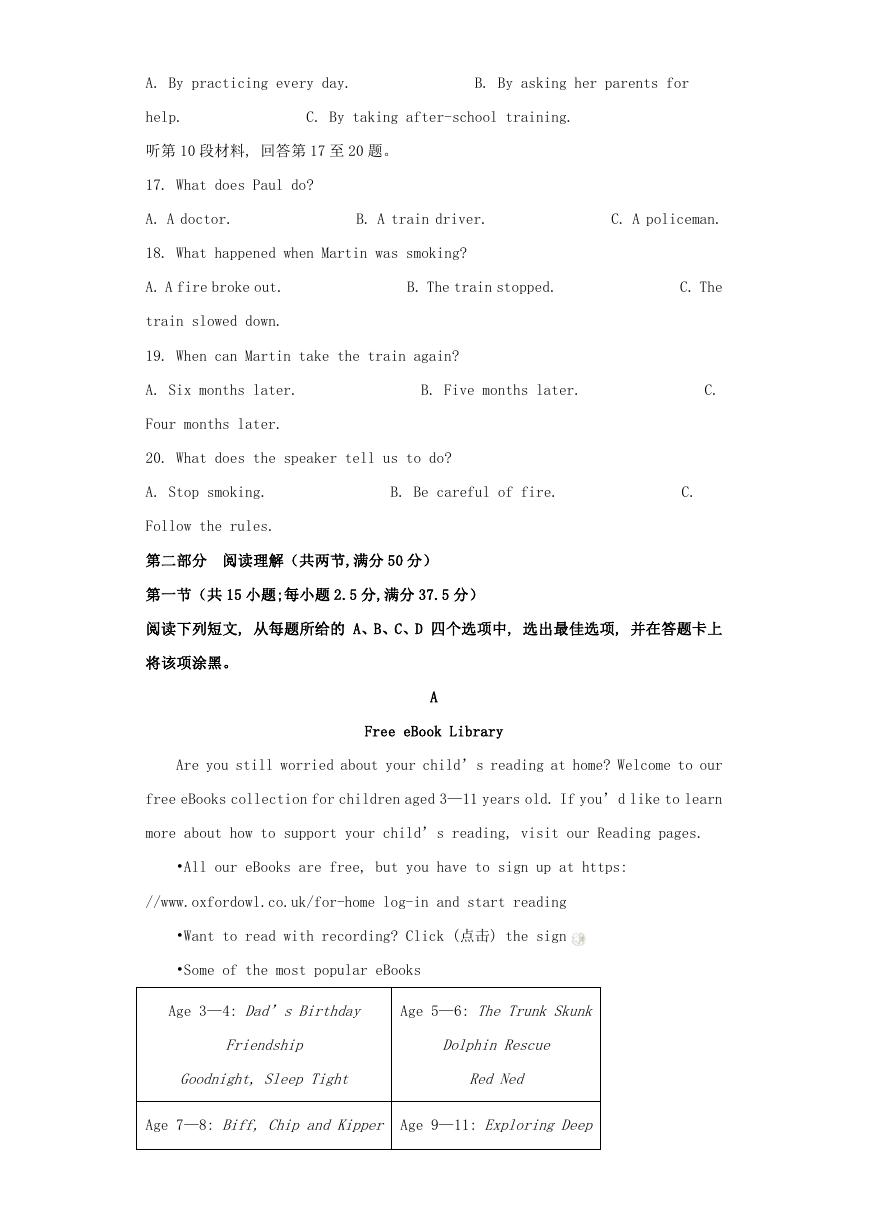
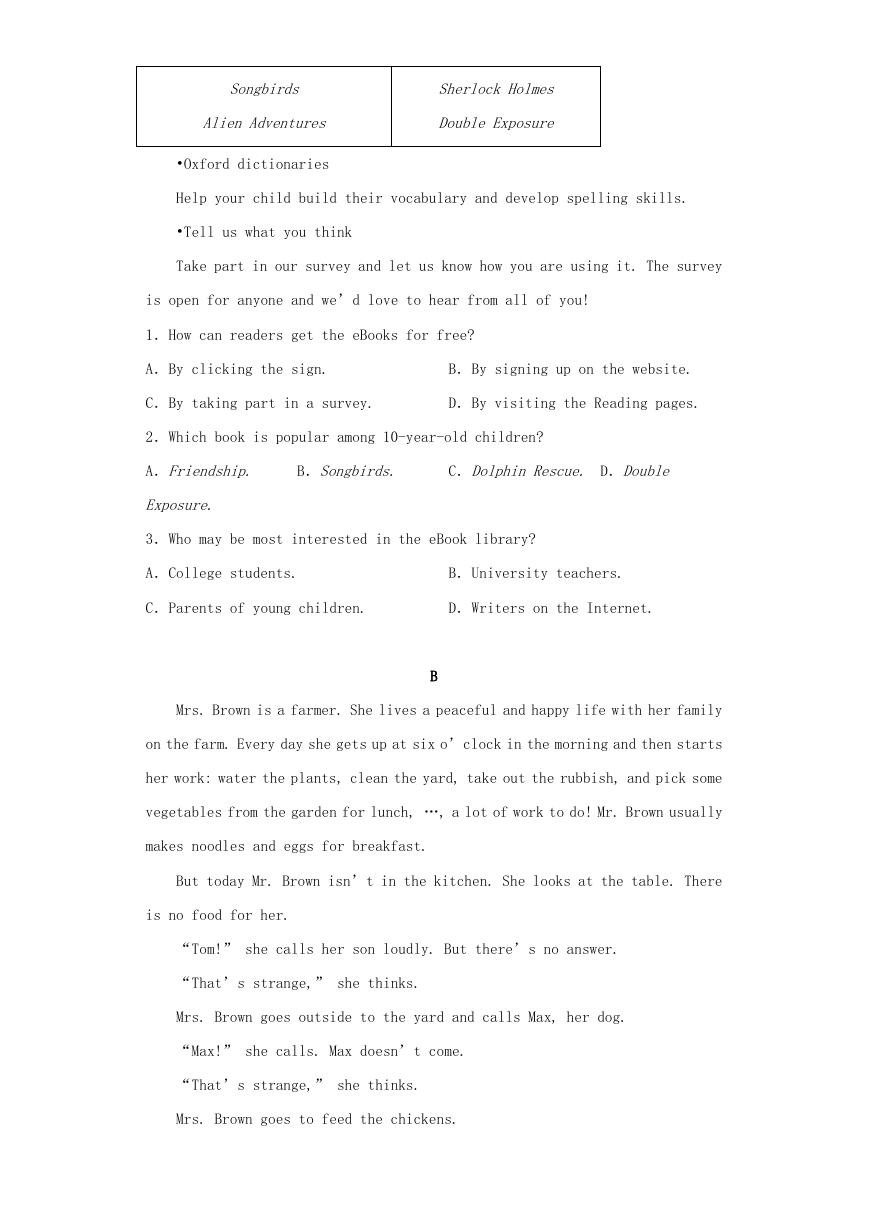
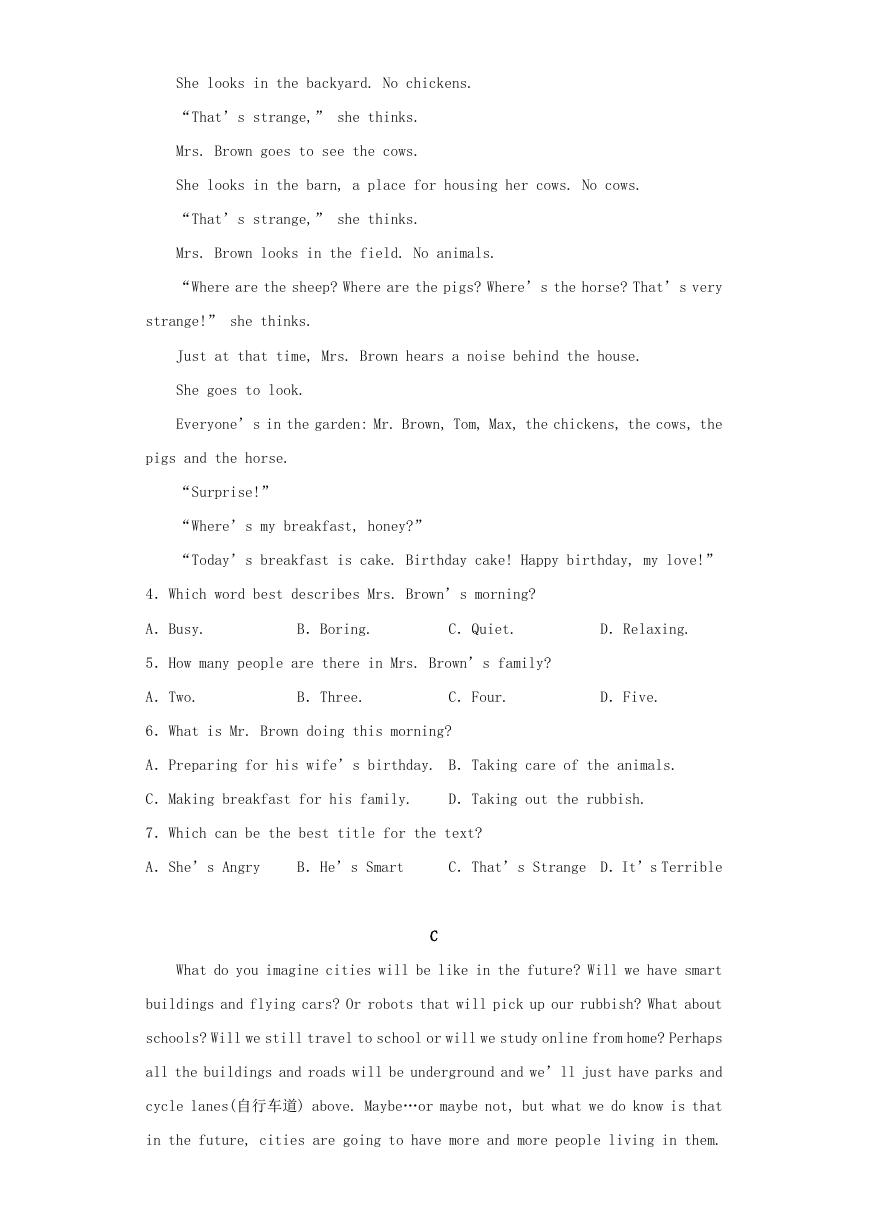
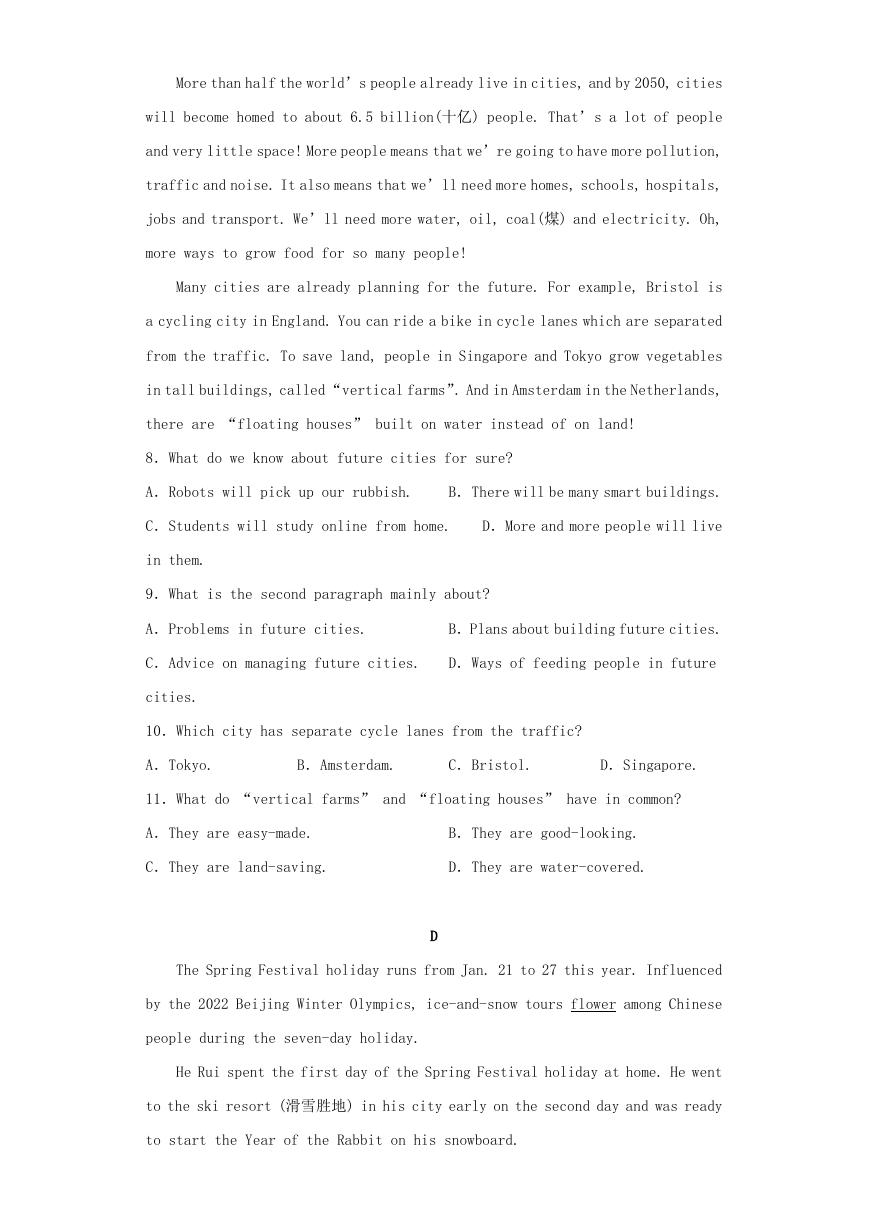
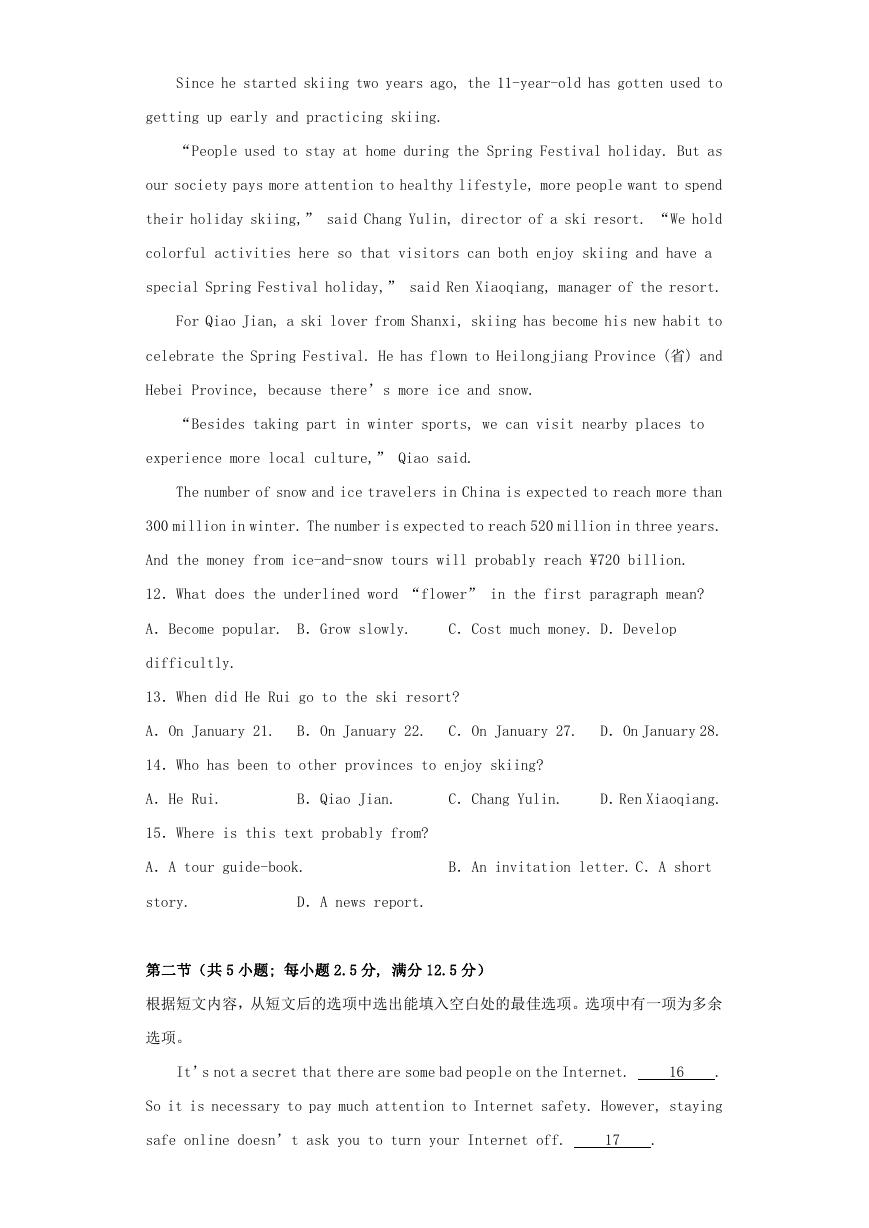
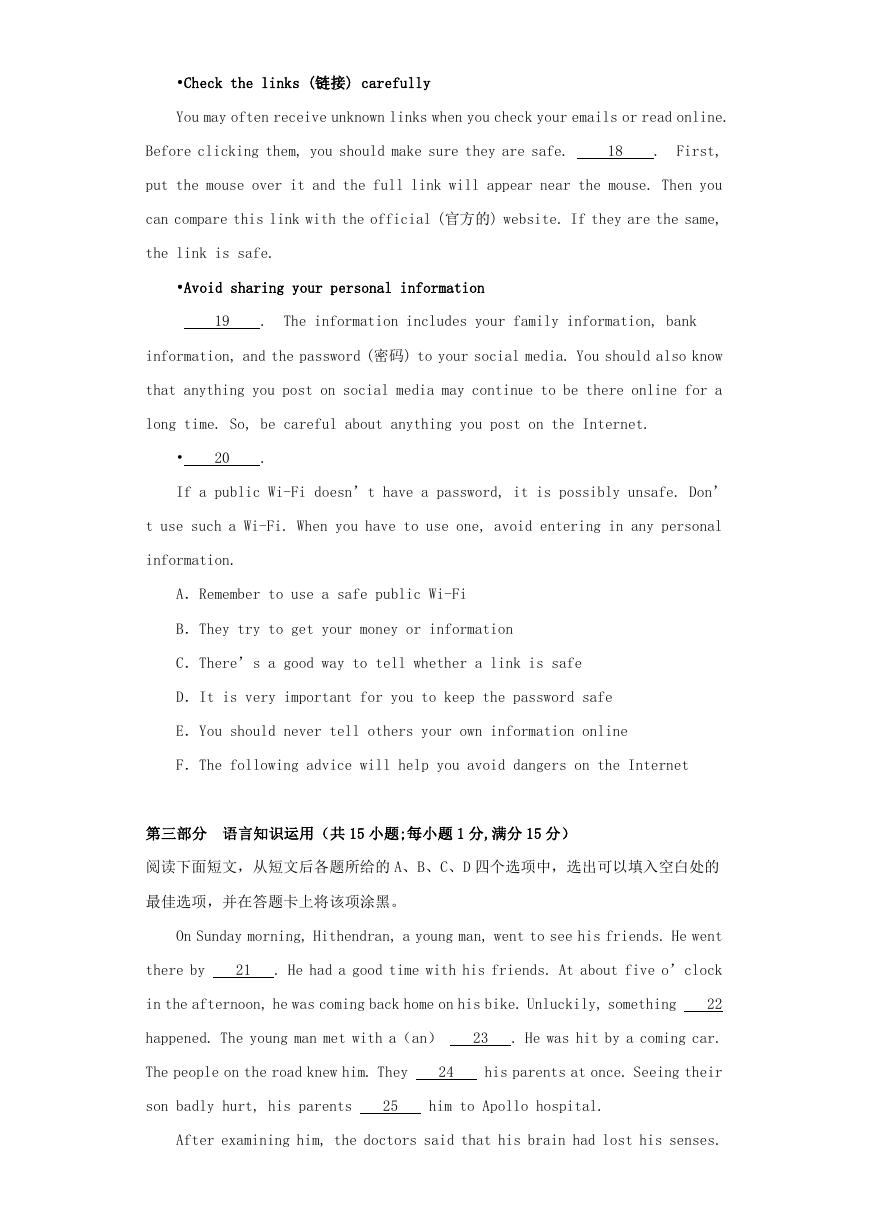








 2023年江西萍乡中考道德与法治真题及答案.doc
2023年江西萍乡中考道德与法治真题及答案.doc 2012年重庆南川中考生物真题及答案.doc
2012年重庆南川中考生物真题及答案.doc 2013年江西师范大学地理学综合及文艺理论基础考研真题.doc
2013年江西师范大学地理学综合及文艺理论基础考研真题.doc 2020年四川甘孜小升初语文真题及答案I卷.doc
2020年四川甘孜小升初语文真题及答案I卷.doc 2020年注册岩土工程师专业基础考试真题及答案.doc
2020年注册岩土工程师专业基础考试真题及答案.doc 2023-2024学年福建省厦门市九年级上学期数学月考试题及答案.doc
2023-2024学年福建省厦门市九年级上学期数学月考试题及答案.doc 2021-2022学年辽宁省沈阳市大东区九年级上学期语文期末试题及答案.doc
2021-2022学年辽宁省沈阳市大东区九年级上学期语文期末试题及答案.doc 2022-2023学年北京东城区初三第一学期物理期末试卷及答案.doc
2022-2023学年北京东城区初三第一学期物理期末试卷及答案.doc 2018上半年江西教师资格初中地理学科知识与教学能力真题及答案.doc
2018上半年江西教师资格初中地理学科知识与教学能力真题及答案.doc 2012年河北国家公务员申论考试真题及答案-省级.doc
2012年河北国家公务员申论考试真题及答案-省级.doc 2020-2021学年江苏省扬州市江都区邵樊片九年级上学期数学第一次质量检测试题及答案.doc
2020-2021学年江苏省扬州市江都区邵樊片九年级上学期数学第一次质量检测试题及答案.doc 2022下半年黑龙江教师资格证中学综合素质真题及答案.doc
2022下半年黑龙江教师资格证中学综合素质真题及答案.doc